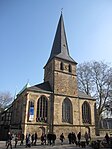Essen Hauptbahnhof

Essen Hauptbahnhof (German for "Essen main station") is a railway station in the city of Essen in western Germany. It is situated south of the old town centre, next to the A 40 motorway. It was opened in 1862 by the Bergisch-Märkische Eisenbahn. However, the station was not the first in Essen: as the station called Essen (today Essen-Altenessen) on the Köln-Mindener Eisenbahn was opened in 1847. The station suffered extensive damage in World War II and was almost completely rebuilt in the 1950s and 1960s. During the following years, the Essen Stadtbahn and the A 40 were other construction projects affecting the station. Today it is an important hub for local, regional and long-distance services, with all major InterCityExpress and InterCity trains calling at the station as well as RegionalExpress and Rhein-Ruhr S-Bahn services. Trains of all kinds call at the station, from long distance to local services. It used to be one of the Metropolitan stops on the Hamburg to Cologne line before the service was discontinued in 2002. There are night services by EuroNight trains to cities such as Moscow and Brussels, and DB NachtZug trains to Zurich and Vienna, among others. Some 400 trains pass through the station each day, making Essen Hauptbahnhof the third busiest railway station in the Ruhr Area after Dortmund Hauptbahnhof and Duisburg Hauptbahnhof.
Excerpt from the Wikipedia article Essen Hauptbahnhof (License: CC BY-SA 3.0, Authors, Images).Essen Hauptbahnhof
Gildehofstraße, Essen Stadtkern (Stadtbezirk I)
Geographical coordinates (GPS) Address Nearby Places Show on map
Geographical coordinates (GPS)
| Latitude | Longitude |
|---|---|
| N 51.451783 ° | E 7.014331 ° |
Address
Essen Hauptbahnhof
Gildehofstraße
45127 Essen, Stadtkern (Stadtbezirk I)
North Rhine-Westphalia, Germany
Open on Google Maps








